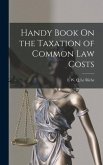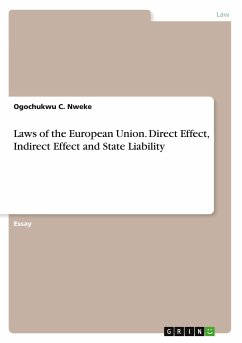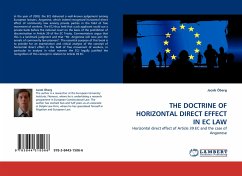This book considers direct taxation in the EU. This is an area which often provokes controversy due to the tensions between the tax sovereignty of the individual Member States and the desire for an integrated internal market. It offers a critical review of the legislative and case-law developments as well as of the European Commission's proposals, in light of the concerns which have been expressed by the European Commission in terms of proper functioning of the EU's internal market. Luca Cerioni set out a series of benchmarks determined from the objectives expressed by the European Commission in a number of Communications over the last three years. These benchmarks include: the simplification of the direct tax environment currently composed of many different national systems overlapping with each other; the removal of all remaining direct tax obstacles to cross-border activity; the reduction of abusive forum-shopping practices and in general of aggressive tax planning strategies by multinationals; and more legal certainty for all businesses and individuals carrying on activities and receiving income in more than one EU Member State. The book assesses the legislative and case-law developments, along with the Commission's proposed initiatives, against these benchmarks. In doing so it offers answers to key questions as to which Directives and/or rulings have left legal uncertainty and in what respects, which ones have ended up creating or increasing the scope for aggressive tax planning. The book then goes on to put forward a comprehensive solution relating to tax residence which would contribute to the EU project to the mutual benefit of Member States and of taxpayers.
Within the European Union, direct taxation is an area which often provokes controversy due to tensions between the tax sovereignty of the individual Member States and the desire for an integrated internal market. This book offers a critical review of the legislative and case-law developments in this area at the EU level, and reviews the European Commission's proposed solutions in light of their concerns regarding the proper functioning of the EU's internal market. Luca Cerioni set out a series of benchmarks determined from the objectives expressed by the European Commission, including: the elimination of double taxation and double non-taxation; the simplification of cross-border tax compliance; the reduction of abusive forum-shopping practices and general aggressive tax planning strategies; legal certainty for all businesses and individuals carrying on activities and receiving income in more than one EU Member State. Cerioni uses these benchmarks to ask which Directives and/or rulings have left legal uncertainty, and which have ended up creating or increasing the scope for aggressive tax planning. The book puts forward a comprehensive solution for a new optimal regime relating to tax residence, which would contribute to the EU project to the mutual benefit of Member States and taxpayers. As a thorough and critical discussion of EU tax rules in force, and of the European Court's case law in direct taxation, this book will be of great use to academic researchers and students of EU law, tax practitioners, and policy-makers at the EU and national level.
Hinweis: Dieser Artikel kann nur an eine deutsche Lieferadresse ausgeliefert werden.
Within the European Union, direct taxation is an area which often provokes controversy due to tensions between the tax sovereignty of the individual Member States and the desire for an integrated internal market. This book offers a critical review of the legislative and case-law developments in this area at the EU level, and reviews the European Commission's proposed solutions in light of their concerns regarding the proper functioning of the EU's internal market. Luca Cerioni set out a series of benchmarks determined from the objectives expressed by the European Commission, including: the elimination of double taxation and double non-taxation; the simplification of cross-border tax compliance; the reduction of abusive forum-shopping practices and general aggressive tax planning strategies; legal certainty for all businesses and individuals carrying on activities and receiving income in more than one EU Member State. Cerioni uses these benchmarks to ask which Directives and/or rulings have left legal uncertainty, and which have ended up creating or increasing the scope for aggressive tax planning. The book puts forward a comprehensive solution for a new optimal regime relating to tax residence, which would contribute to the EU project to the mutual benefit of Member States and taxpayers. As a thorough and critical discussion of EU tax rules in force, and of the European Court's case law in direct taxation, this book will be of great use to academic researchers and students of EU law, tax practitioners, and policy-makers at the EU and national level.
Hinweis: Dieser Artikel kann nur an eine deutsche Lieferadresse ausgeliefert werden.








